
In the shadow of President Donald Trump’s escalating tariff war, the European Union is charting a bold course to diversify its economic partnerships, with signs of a surprising thaw in trade relations with China.
As transatlantic ties strained under the weight of U.S. protectionism, the EU is reportedly exploring lifting its tariffs on Chinese electric vehicles (EVs), a move that could pave the way for deeper business agreements and reshape global trade dynamics. This strategic pivot, driven by necessity and opportunity, underscores a broader push among U.S. allies to seek new markets amid fears that Trump’s policies have fractured long-standing alliances.
The catalyst for this shift is Trump’s aggressive trade agenda, which has hit the EU with a 20% “reciprocal” tariff on €380 billion ($432 billion) of its exports, temporarily delayed for 90 days but still looming. Additional levies include a 25% tariff on EU steel and aluminum and a 25% duty on cars and auto parts, with threats of further tariffs on lumber, semiconductors, and pharmaceuticals. These measures, part of Trump’s “America First” doctrine, have jolted the EU, which exported €532 billion in goods to the U.S. last year, making it the bloc’s largest market.
Register for Tekedia Mini-MBA edition 19 (Feb 9 – May 2, 2026).
Register for Tekedia AI in Business Masterclass.
Join Tekedia Capital Syndicate and co-invest in great global startups.
Register for Tekedia AI Lab.
European Commission President Ursula von der Leyen, speaking in Brussels on Thursday, called the tariffs “a major blow to the world economy,” warning of spiraling uncertainty and rising protectionism.
Faced with this economic siege, the EU is accelerating efforts to diversify its trade network, a strategy von der Leyen framed as engaging with “countries that account for 87% of global trade and share our commitment to a free and open exchange.” The bloc, already boasting the world’s largest trade agreement network with 75 partners covering €2 trillion in trade, is now doubling down.
Recent months have seen renewed momentum in talks with the United Arab Emirates, Malaysia, Indonesia, Thailand, and India, while a landmark political agreement with the Mercosur bloc—Argentina, Brazil, Paraguay, and Uruguay—was reached in December, promising a market of 780 million consumers. Even post-Brexit talks with the UK are gaining traction, signaling a broad push to secure new markets.
But the most intriguing development is the EU’s warming stance toward China, particularly in the electric vehicle sector. Last year, the EU imposed tariffs of up to 35.3% on Chinese EVs, citing unfair state subsidies that threatened European automakers. Now, in a striking reversal, Brussels and Beijing are negotiating to replace these tariffs with minimum price commitments, a step that could ease tensions and open doors to broader cooperation.
China’s Commerce Ministry confirmed on Thursday that talks with EU Trade Commissioner Maros Sefcovic have restarted, focusing on EVs and industrial collaboration.
“We’re seeing a pragmatic shift,” said an EU official, speaking anonymously due to the sensitivity of the negotiations. “Lifting EV tariffs could be a goodwill gesture to unlock bigger deals.”
This pivot comes as Trump’s tariffs on Chinese goods, now at a staggering 145%, risk diverting low-cost Chinese products to Europe, a concern von der Leyen raised in a call with Chinese Premier Li Qiang this week. The EU is exploring mechanisms to monitor such diversions, but the prospect of deeper ties with China is gaining traction.
Spain’s Prime Minister Pedro Sanchez, fresh from a Beijing visit on Friday, called for a “balanced relationship,” while Hungary and others advocate closer engagement. However, skepticism persists, with French Prime Minister Francois Bayrou warning against over-reliance on China, which he accused of aiming to “replace all European producers in agriculture and industry.”
The EU’s flirtation with China is not without risks. Chinese EVs, led by brands like BYD and Nio, already hold 25% of the European market, and easing tariffs could intensify pressure on Germany’s struggling auto sector, which supports 14 million jobs.
“We’re walking a tightrope,” said Sigrid de Vries, head of the European Automobile Manufacturers’ Association. “We need new partners, but not at the cost of our industries.”
Analysts also caution that Trump’s tariffs could exacerbate existing EU-China trade imbalances, with fears of Beijing dumping excess goods in Europe.
Beyond China, the EU is eyeing broader horizons. Von der Leyen announced on Thursday plans to explore cooperation with the Comprehensive and Progressive Agreement for the Trans-Pacific Partnership, a trade bloc spanning Australia to Canada, which Trump abandoned in 2017. New Zealand’s Prime Minister Christopher Luxon has proposed using it as a foundation for a rules-based trading pact with the EU, a move that could anchor the bloc in Asia’s dynamic markets.
Currently, the EU remains open to salvaging transatlantic trade. Sefcovic heads to Washington on Monday to push for tariff reductions, armed with offers like zero-tariff deals for cars and industrial goods. But with Trump’s administration showing little appetite for compromise, Sefcovic described recent talks as “frank” but fruitless, hope is fading.
“We’re ready to negotiate, but we’re not naive,” von der Leyen said, hinting at retaliatory tariffs worth €26 billion on U.S. goods, from bourbon to motorcycles, set for mid-April if talks fail.
As Trump’s tariffs redraw the global trade map, the EU’s pivot reflects a broader trend among U.S. allies. Canada, hit with steel and aluminum duties, is matching them “dollar for dollar,” while Malaysia opts for dialogue over retaliation. Japan and South Korea, wary of losing U.S. market access, are cautiously seeking exemptions. However, the EU’s moves signal a deeper reckoning: a world where allies, once tethered to Washington, are forging their own paths.



